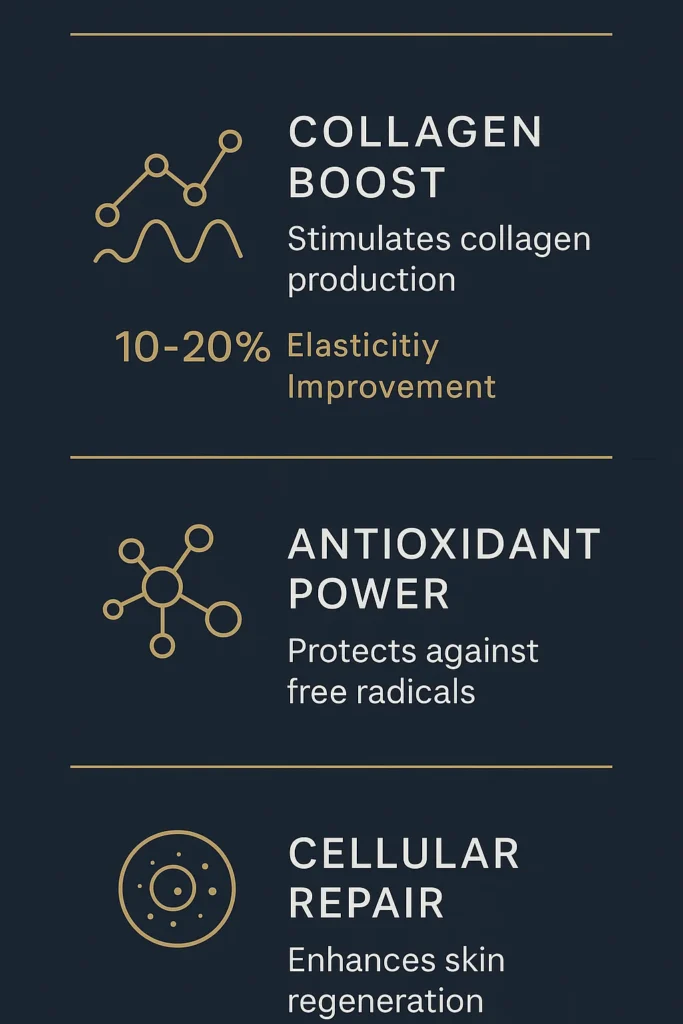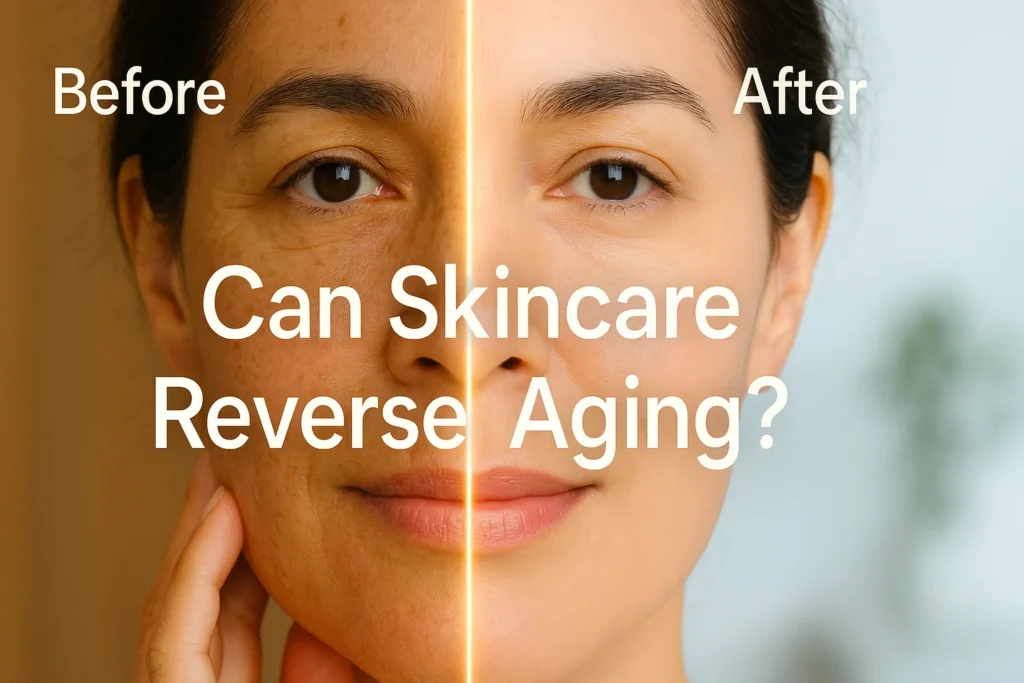Skincare cannot fully reverse aging at a cellular level. However, it can greatly improve skin appearance, function, and health, making you look more youthful.
In a Nutshell: Can Skincare Reverse Aging?
- You will learn what causes skin aging.
- You will discover how skincare can improve your skin’s look and feel.
- You will understand the real benefits and limits of anti-aging products.
Estimated reading time: 7 minutes
Do you wonder if your skincare routine can truly turn back time? Many people seek ways to keep their skin looking young. Let’s explore what modern science says about can skincare reverse aging. We will look at what works and what to expect.
Understanding Skin Aging

Skin aging happens for two main reasons. First, your body naturally ages. This is called intrinsic aging. Your skin makes less collagen and elastin. These proteins keep your skin firm and stretchy. Less of them means wrinkles, sagging, and dryness.
Second, outside factors speed up aging. This is extrinsic aging. Things like sun rays (UV radiation), pollution, and smoking cause this. They create oxidative stress and damage your skin cells.
Key Biological Processes in Skin Aging
- Oxidative stress: Harmful molecules called free radicals damage skin cells.
- Protein breakdown: Enzymes break down collagen and elastin fibers.
- Inflammation: Swelling in the skin adds to damage.
- Slower repair: Skin cells do not fix themselves as quickly.
- Cell limits: Cells can only divide so many times. This speeds up aging.
Can Skincare Reverse Aging?
Science shows skincare cannot fully reverse aging at the cell level. But some treatments and ingredients can greatly improve your skin appearance. They make your skin work better and look younger. This can feel like ‘reversing’ some visible signs of aging.
Plant-Based Power
Many plant ingredients help fight skin aging. They are full of antioxidants. These stop free radicals from causing damage. They also stop enzymes that break down skin proteins.
For example, vitamins C and E, and certain plant compounds, make your skin more elastic. They also reduce dark spots and help skin heal. This leads to better skin quality and a more youthful appearance. You can learn more about how these active ingredients work.
Cutting-Edge Scientific Advances
New science uses ideas from how cells heal and grow.
- Stem Cell Therapy: This uses special cells to help make new collagen and elastin. It can reduce wrinkles and sagging. But human studies are still ongoing.
- Exosome Therapy: Tiny bubbles from cells help skin repair itself. Early studies show they can boost collagen and elastin. They also improve skin texture. More human studies are needed.
- Probiotic Skincare: Some companies are using good bacteria in skincare. These can reduce wrinkles and dark spots. L’Oréal has even filed a patent for this new approach.
Established and Emerging Ingredients
- Niacinamide (Vitamin B3): This helps your skin barrier. It improves hydration and reduces dark spots. It may even lower the risk of some skin cancers.
- Melatonin: This is a strong antioxidant for night creams. It helps your skin repair itself while you sleep. It fights free radicals and helps with cellular regeneration. This is key for “well-aging” products.
- Hyaluronic Acid: This pulls water into your skin. It makes skin plump and reduces fine lines. It is a key part of many anti-aging serums.
- Retinoids: These vitamin A forms are a top choice. They speed up cell turnover and boost collagen. They help fix sun damage.
- Peptides and Collagen Extracts: These signal your skin to repair itself. They help your skin make more proteins.
- Consistency: Use products daily. Regular use brings the best results.
- Sun Protection: Always wear sunscreen. UV rays cause most skin aging.
- Gentle Care: Avoid harsh scrubbing. Treat your skin kindly to prevent damage.
- Healthy Habits: Eat well and sleep enough. Your skin reflects your overall health.
Technological and Procedural Advances
- Fractionated Laser Treatments: Lasers like Fraxel help skin renew itself. They reduce pre-cancer spots by improving collagen.
- Microneedling and Radiofrequency: These treatments cause tiny injuries. This makes your skin heal itself and produce more collagen.
- Cryotherapy and Photobiomodulation: These are newer ways to boost skin vitality and reduce damage.
Statistical Data and Market Trends (U.S. Context)
Many Americans worry about skin aging. Over 85% of people aged 45 and older are concerned about wrinkles. The U.S. anti-aging skincare market is large. It was about $4 billion in 2024. It is expected to grow by 6-8% each year. New products and treatments drive this growth.
Recent studies show new therapies like exosomes can improve skin elasticity. They show 10-20% better elasticity over 3-6 months. People are also buying more products with melatonin and niacinamide. Sales for these have grown over 12% yearly.
Limitations and Realistic Expectations

Skincare products mainly prevent damage and repair existing issues. They do not fully turn back your body’s natural aging clock. You need to use them consistently. Many benefits appear over months or even years.
Also, some deep cellular aging cannot be changed by creams. Procedures like lasers can help a lot. But they often need ongoing care and can be costly. To see results, you need to be patient. You can find a realistic timeline for skincare results here.
Your Anti-Aging Skincare Checklist
Conclusion
Modern science shows skincare cannot fully reverse aging. But it can greatly improve your skin structure. It can reduce wrinkles, boost skin elasticity, and bring back a more youthful appearance. It does this by fighting oxidative stress and inflammation.
For you, this means a shift towards pro-longevity skincare. This combines prevention, repair, and ongoing care. It uses ingredients like niacinamide, melatonin, hyaluronic acid, and probiotics. The future of anti-aging skincare mixes science, technology, and regular use. It offers real skin rejuvenation. You can also explore essential skincare tips for every woman to help your journey.







